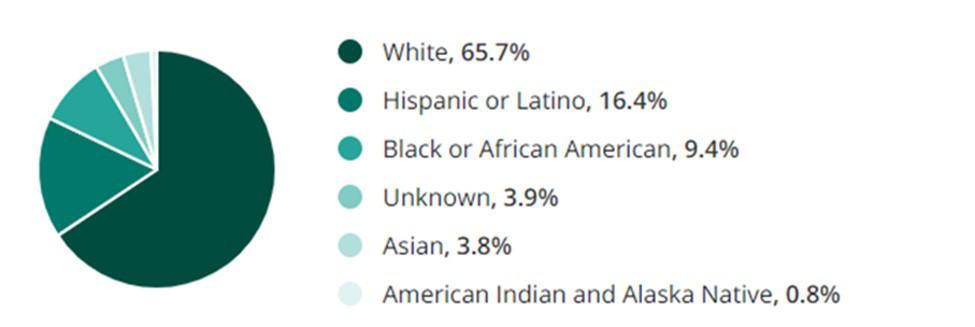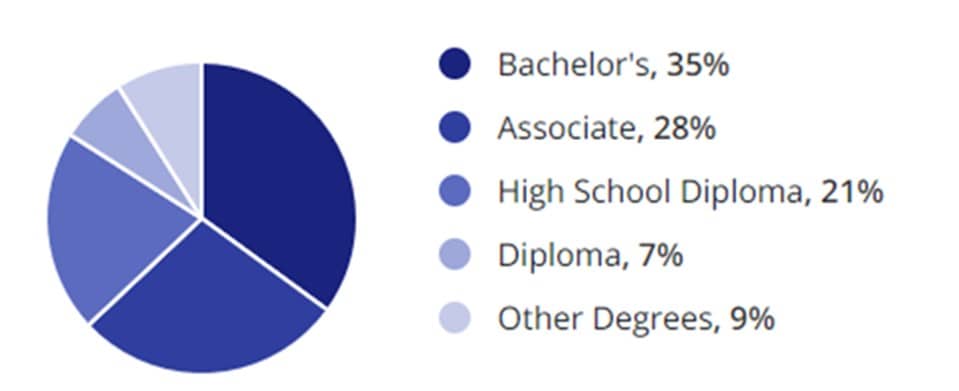Welcome to your ultimate guide for finding your dream job in the administrative field. If you’re seeking new challenges, looking to specialize further in your career, or even stepping into the job market for the first time, you’ve come to the right place. The administrative profession is often described as the backbone of business operations, supporting the core functions that drive success. The opportunities within this field are vast, encompassing roles in bustling corporations, specialized positions like medical administrative assistant jobs, and technical niches such as system administrator jobs.
Administrative roles are particularly appealing in today’s environment, which values diversity and inclusion more than ever. They welcome professionals from all walks of life, offering careers where skills, commitment, and diversity are appreciated and seen as essential to organizational success. This guide will walk you through everything you need to know about making your mark in this field – from education requirements and areas of expertise to understanding the current demographics, salary expectations, and hiring trends. We’ll also delve into the essential skills you’ll need and look at the future outlook for administrative professionals.
Arming yourself with the correct information, resources, and community support can make all the difference in successfully pursuing a fulfilling administrative career. Let this guide be the catalyst to a profession where your dedication and diversity add value and set you on a path to achieving your career aspirations.
Educational Requirements for Administrative Jobs
Starting a career in administrative jobs means having the right balance between formal education and practical experience. Whether you’re aiming for medical administrative assistant jobs or nursing home administrator jobs, education paves the way. Here’s what you need to know:
- High School Diploma or GED: The primary entry point for most administrative roles. It opens the door to entry-level positions and is the first step towards more advanced roles.
- Certifications: Boost your resume with certifications such as Certified Administrative Professional (CAP) or Microsoft Office Specialist (MOS). These showcase your dedication to the field and mastery of essential tools.
- Associate Degree: An associate degree in business administration or a related field can set you apart. This education level equips you with a deeper understanding of business operations, preparing you for complex tasks.
- Specialized Degrees: For roles in areas like medical administrative assistant jobs, relevant coursework in healthcare administration or legal studies is invaluable. It provides the specialized knowledge needed to excel.
- Continuing Education: The field values lifelong learners. Stay ahead by engaging in workshops, online courses, and additional certifications, especially in emerging technologies and Information Technology Jobs.
Whether diving into sports administration jobs or aiming to become a program administrator, education is your launching pad. By building a solid educational foundation and continuing to grow your knowledge, you set the stage for a successful career in administrative jobs.
Areas of Expertise in Administrative Jobs
Administrative jobs are diverse, with each specialty requiring unique skills and knowledge. Whether it’s ensuring seamless day-to-day operations or supporting specific departments, here are key areas of expertise:
- Executive Assistants: These professionals support senior executives, managing schedules, handling correspondence, and assisting with decision-making processes.
- Legal Secretaries: This role is specialized, supporting legal teams with knowledge in document preparation, legal jargon, and court procedures.
- Medical Secretaries: Working in healthcare settings requires understanding medical terminology, patient scheduling, and handling confidential information.
- Data Entry Clerks: Speed and accuracy are vital for these clerks, who update and maintain digital databases with critical information.
- Office Managers: They are the backbone of office operations, ensuring smooth daily functions, managing staff, and overseeing administrative activities.
In addition to these roles, administrative jobs also span into niche areas like sports administration jobs and system administrator jobs, each demanding a distinct skill set and passion. No matter the specialization, mastering the required expertise opens doors to jobs and fulfilling careers in vibrant and dynamic environments.
Demographics in the United States
The administrative profession in the United States showcases the diverse fabric of the nation, welcoming individuals across various demographics. Understanding the diversity within the field offers insights into its inclusive nature.
Ethnicity/Race:
The workforce in administrative jobs reflects America’s diverse ethnic and racial composition. Efforts to promote diversity in the workplace have led to an enriching mix of perspectives and talents. This commitment to inclusivity ensures that administrative jobs benefit from various skills and experiences, making the profession more robust and adaptable.

Gender:
Women have historically played a significant role in the administrative field, and this trend continues. Female professionals often hold executive assistants and office manager positions, underscoring the field’s appeal to women seeking to advance their careers in supportive, dynamic environments.

Age:
The administrative sector embraces individuals across a broad age spectrum. From young professionals entering the workforce to experienced veterans who bring a wealth of knowledge to their roles, the diversity in age enriches the profession. It fosters an environment where mentorship and innovation thrive, ensuring administrative jobs remain at the forefront of organizational success.

These demographic trends in administrative jobs highlight the profession’s commitment to creating diverse, inclusive workplaces. This diversity enhances the work culture and contributes to more robust, effective business operations.
Salary Trends in Administrative Jobs
Salaries in administrative roles vary widely, influenced by factors such as experience, specialization, and location. Understanding current trends can help professionals set realistic expectations and strive for competitive salaries.
- Entry-Level Roles: Administrative assistants in entry-level positions typically see salaries ranging from $30,000 to $40,000 annually. The variation largely depends on geographic location and the size of the organization.
- Specialized Administrative Roles: Professionals in specialized fields, like legal secretaries or medical administrative assistants, can expect higher salaries. These positions often command annual earnings from $35,000 to $45,000, reflecting the additional expertise required.
- Executive Assistants: Those providing top-tier support to executive-level management can see even more significant compensation, with annual salaries ranging from $50,000 to $70,000, subject to experience and the complexity of their responsibilities.
- Geographical Influence: Administrative professionals in metropolitan areas or locations with a high cost of living generally earn higher salaries. This adjustment aligns with the economic demands of these regions.
The evolution of the field, marked by increased digitalization and demand for technical skills, is beginning to shape salary trends. Administrators proficient in digital tools and software may find themselves in a solid position to negotiate higher pay. As technology continues to permeate the workplace, these competencies become increasingly valuable.
While salary ranges in administrative positions are broad, the potential for growth and advancement remains strong. Earning certifications, advancing your education, and gaining specialized skills are effective strategies for moving up the salary ladder in this dynamic field.
Hiring Trends in Administrative Jobs
The landscape for administrative jobs is continually evolving, influenced by technological advancements, economic fluctuations, and changing organizational needs. These trends shape both the opportunities and challenges for administrative professionals today.
- Remote and Flexible Work: The surge in remote work has significantly influenced hiring trends. Organizations are now looking for administrative professionals capable of managing tasks independently, often remotely. This trend broadens job opportunities, allowing candidates to search beyond their immediate location.
- Technology Proficiency: With the integration of digital tools in everyday operations, there’s an increasing demand for candidates skilled in digital platforms and software. From collaborative tools to advanced scheduling systems, technological proficiency is a crucial hiring criterion.
- Soft Skills Advantage: Beyond technical competencies, soft skills such as communication, adaptability, and problem-solving are highly valued. Candidates who excel in these areas and possess the necessary technical skills often have a competitive edge.
- Specialization: There’s a noticeable shift towards specialized roles. While general administrative support will always be needed, specialized fields like medical administrative assistant jobs and sports administration jobs are becoming increasingly prevalent. These roles typically command higher salaries and present unique career paths.
- Diversity and Inclusion: There’s a concerted effort across organizations to foster more inclusive workplaces. Companies are recognizing the value of diverse administrative teams that can offer varied perspectives and experiences.
To navigate successfully through these trends, administrative professionals should focus on ongoing learning and skill development, particularly in digital literacy and soft skills. The dynamic nature of the job market requires adaptability and a proactive approach to career development.
Education Levels in Administrative Jobs
An individual’s level of education can highly influence the path to starting or advancing within administrative jobs. The right educational background opens doors to various opportunities in this field, from entry-level roles to positions requiring more expertise.
High School Diploma or Equivalent:
Many administrative careers begin with a high school diploma or GED. This introductory qualification is often sufficient for entry-level positions like receptionists or administrative assistants. Starting here, individuals can gain valuable experience and insight into office operations.
Associate Degree:
An associate degree in business administration, office management, or a similar field boosts a candidate’s attractiveness to potential employers. Those with this level of education often qualify for a broader range of roles, including more specialized administrative tasks.
Bachelor’s Degree:
Pursuing a bachelor’s degree opens up even more possibilities. Business administration, human resources, or communication degrees are particularly beneficial, aligning with higher-level administrative positions such as office managers, executive assistants, and beyond.
Professional Certifications:
- Certified Administrative Professional (CAP): Demonstrates professionalism and advanced administrative skills.
- Microsoft Office Specialist (MOS): Verifies expertise in essential software, a must-have for nearly every administrative role.
Continuing Education and Professional Development:
Given the dynamic nature of the administrative field, lifelong learning is critical. Whether through workshops, online courses, or additional certifications—especially in emerging technologies—these efforts keep administrative professionals competitive and impactful in their roles.
The educational achievements of administrative professionals can significantly vary, reflecting the inclusive and opportunistic nature of the field. By investing in education and professional development, individuals are well-positioned to navigate a successful administrative career path.

Skills in Demand for Administrative Jobs
Specific skills are precious in the constantly evolving administrative job market. Keeping pace with these in-demand skills can significantly enhance employability and career growth for administrative professionals.
Technical Skills:
- Proficiency in Office Software: Mastery of Microsoft Office Suite and Google Workspace is crucial. These tools support various tasks, from document creation and data management to effective communication.
- Data Entry: Fast and accurate data entry skills are essential for maintaining up-to-date records and databases, a fundamental part of many administrative roles.
- Digital Platforms Knowledge: Understanding project management tools, customer relationship management (CRM) software, and social media platforms can significantly enhance an administrative professional’s efficiency and effectiveness.
Soft Skills:
- Communication Skills: Effective written and verbal communication is vital. Administrative professionals often act as the connective tissue between departments, management, and clients, making clear communication crucial.
- Organizational Abilities: The capability to manage schedules, coordinate projects, and keep operations running smoothly underlines the importance of strong organizational skills.
- Problem-Solving Ability: The best administrative professionals can anticipate challenges, propose solutions, and make informed decisions quickly and effectively.
Specialized Knowledge:
In niches such as medical administrative assistant jobs or legal secretary positions, specialized knowledge can set candidates apart. Understanding industry-specific terminology, procedures, and software can be a definitive advantage.
As administrative roles integrate more closely with technology and digital communication, staying updated on these skills is essential. Administrative professionals can maintain their relevance and effectiveness in a dynamic workplace by focusing on technical competencies and soft skills development.
Current & Future Administrative Jobs Outlook
The outlook for administrative jobs reflects the broader trends affecting businesses and technology, indicating current opportunities and future directions for the profession.
Current Landscape:
Today, administrative roles are increasingly characterized by their integration with technology. Proficiency in digital tools, managing remote work setups, and ensuring data security are becoming standard expectations. Additionally, adopting remote and hybrid work models has opened new avenues for administrative support roles, diversifying the opportunities available.
Future Trends:
- Automation and AI: As automation and artificial intelligence (AI) streamline routine tasks, administrative professionals must focus on adding value that technology alone cannot provide. Embracing technology to enhance productivity and contribute strategically to organizations will be critical.
- Specialized Roles: The demand for specialization is expected to increase, with roles such as medical administrative assistant jobs and system administrator jobs becoming more critical. Professionals with targeted skills and knowledge will find ample opportunities in these areas.
- Diversity and Inclusion: As workplaces prioritize diversity and inclusion, administrative roles will be crucial in supporting inclusive cultures and practices. This focus on diversity enriches the work environment and opens doors for a broader range of candidates.
The future looks bright for administrative professionals who are adaptable, continuously learn, and leverage new technologies. Keeping an eye on these trends and positioning oneself accordingly will be essential for those looking to thrive in this evolving field.
FAQs
What is the current state of administrative jobs?
Administrative jobs are evolving, significantly shifting towards digital proficiency and remote work capabilities. The demand for skilled professionals in administrative roles remains strong, especially for those adept at using digital tools and managing virtual offices.
How is technology impacting administrative roles?
Technology is reshaping administrative jobs by automating routine tasks and enhancing efficiency through digital platforms. This shift requires administrative professionals to develop office software, digital communication, and data management skills to stay competitive in the job market.
What are the future trends in administrative jobs?
Future trends point towards greater automation and the need for specialized skills. Roles such as medical administrative assistant jobs and system administrator jobs are expected to rise. Additionally, the emphasis on diversity and inclusion will shape hiring practices, creating a more inclusive workplace.
What skills are in high demand for administrative professionals?
Employers are looking for a combination of technical and soft skills. Critical in-demand skills include proficiency in office software, data entry, digital platform knowledge, effective communication, organizational abilities, and problem-solving skills. Specialized expertise in specific fields is also valuable.
How important is education and professional development in this field?
Education and professional development are critical in the administrative field. Starting with a high school diploma or equivalent and progressing through higher education levels and certifications can significantly enhance career prospects. Continuous learning is pivotal for career advancement, especially in emerging technologies and digital platforms.
What does the demographic landscape look like in administrative jobs?
The demographic landscape in administrative jobs mirrors the diversity of the U.S., with a workforce encompassing various ethnic backgrounds, genders, and age groups. This diversity fosters a prosperous, inclusive work environment that benefits individuals and organizations.
How are salary trends evolving in the administrative field?
Salary trends in the administrative field are influenced by experience, specialization, and location. Specialists and those in metropolitan areas tend to earn higher salaries. Integrating technology into administrative roles also opens up opportunities for higher wages for those with digital skills.
What role does adaptability play in this sector?
Adaptability is crucial in the ever-evolving administrative sector. Professionals who are flexible and willing to embrace new technologies, adapt to changing workplace practices, and continuously upgrade their skills will find the most tremendous success in this dynamic field.
Additional Resources
To further support your journey in the administrative field, consider exploring these valuable resources. They offer a wealth of information, networking opportunities, and tools for professional development critical for aspiring and seasoned administrative professionals.
- International Association of Administrative Professionals (IAAP): An essential resource providing education, certification, and networking for office and administrative professionals. Visit IAAP for details on how to join and benefit from their programs.
- American Society of Administrative Professionals (ASAP): This organization offers resources like webinars, articles, and an annual conference to enhance administrative skills and career prospects. Check out ASAP to learn more.
- Online Learning Platforms: Consider enrolling in courses like Coursera or edX. Many of these are affiliated with reputable universities and cover topics ranging from business and administration to technology skills.
- LinkedIn Learning: For those looking to build specific skills in areas like Microsoft Office, project management, or effective communication, LinkedIn Learning provides courses tailored to administrative professionals.
- Society for Human Resource Management (SHRM): To stay on top of the latest trends in the administrative field, including insights into diversity and inclusion, visit SHRM. Their resources, research, and community engagement opportunities are invaluable. Visit the Society for Human Resource Management for more information.
Utilizing these resources can significantly enhance your administrative knowledge, skills, and professional network. Whether you’re just starting or looking to advance to the next level, these platforms have something beneficial for your career journey.
Conclusion
The journey into administrative jobs offers a landscape filled with opportunities for growth, specialization, and making a significant impact. For aspiring and established administrative professionals, the path is paved with the promise of a rewarding career, thanks to a solid educational foundation, in-demand skills, and an understanding of the current and future job outlook. Embracing continuous learning, adaptability, and technology will be crucial to your success in this dynamic field.
Remember, you’re not navigating this journey alone. By joining Diversity Employment, you gain access to our job board, a vast array of job listings from diverse and inclusive employers, valuable resources, and networking opportunities that can propel you toward your next career milestone. Our commitment is to support you in finding the job and the career path that celebrates your unique skills, aspirations, and the diverse perspectives you bring to the workplace.




